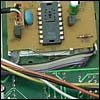
One day in 1979, 24-year-old Steve Jobs walked into Xerox PARC and saw the first GUI—a computer interface with a mouse, designed to work the way people work. As Steve Wozniak describes the scene, Jobs was jumping up and down like a small child, demanding “Why aren’t you doing anything with this? This is the greatest thing! This is revolutionary!”
The executives responded that the world wasn’t ready for this. My bet is that a lot of them were pretty scared by it. What’s the point of being a techie, after all, if everyone can do it? But Jobs grabbed whoever he could from the PARC team and built the Macintosh.
If he hadn’t, I would never have been able to become a writer—being rather dyslexic and uncoordinated. I wouldn’t be able to hold a job—because I can’t sit in an office behind a desk for more than an hour. In fact, I have no clue where I would be—other than a real lousy, clumsy cog in IBM’s wheel.
I used to joke that Apple was my second religion. Then Apple got too popular, and I was never one for being part of a mass movement. Nevertheless, I believe in Apple, because I share Steve Job’s vision. And I believe the course of history was changed through him for the better—real, real better.
When Steve Jobs started Apple at 19, this world was the world of IBM, General Motors, Exxon, Dow Chemicals and Encyclopedia Britannica. Today, make that Google, Apple, eBay, FaceBook and Wikipedia. Jobs promise was that 1984 would not be an Orwellian techno-1984 that would reduce us to uniformed humanoids, and he made good on that promise.
What has changed? Everything changed. The world has been turned on its head.
There was once a world where you had to memorize a manual to use a word processor—the same one just about everyone used. Where you had to take someone from the IT department out to lunch just to get basic stats about the company you managed. Where you had to hire a computer expert to get simple tasks done much as we hire accountants to take care of our income tax statements today (and I hope, not for much longer).
Today, we live in an iWorld. If I don’t like the encyclopedia entry, I modify it. If I’m fed up with working at a desk, I check my iPhone map for the closest park and go work there. Technology is here to serve me. I don’t need to conform to it, I don’t need to be manipulated by it, I barely need to spend time learning it—because it learns me.
So some of you are asking, "What is so beautiful, so messianic, about an iWorld?"
And my personal answer: the iWorld is the destiny of humankind and its saving grace.
It is the belief that a human being is not a cog in the wheel of a great machine, but the inherent master of all machines. It has enabled us to create a world where everybody knows when justice has been perverted and can scream about it to the whole world loud and clear. It is the power by which totalitarian regimes have fallen and will continue to fall, by granting everyone access to knowledge, which is power. And behind it all stands a tacit conviction that every human being contains something of the Divine, and therefore should be master of his or her world and destiny.
In Jewish terms—at least, the way I experienced the evolution of the past thirty-something years: The iWorld is the world of Moses, a world where every man, woman and child is a member of the covenant, and must therefore know the laws and teachings for themselves. And what Big Machine Inc. et al were interested in building was more like the world of Egypt's pharaoh and its priestly caste, of those who inform you “we have all the knowledge and we’ll let you know when you need to know.”
Around 500 years ago, Western Civilization began moving rapidly towards towards its destiny, towards that iWorld. In the last 50 years, we’ve been rapidly shifting gears upward. Up and away from a world where human beings are tightly squeezed through homogenization filters so they’ll fit into the system, into a world designed to fit the human being. Into a world where knowledge is free, opportunities for expression and creativity lie literally at your fingertips, every voice is heard and almost anything becomes possible even for the most handicapped child.
The world has its destiny, produced and directed by the Master of all destiny. A destiny in which Steve Jobs played a principal role. Sure, his role was nothing more than a provider of tools—it's up to us to use them to create that world for which we yearn.




